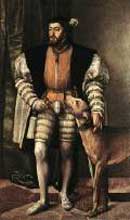Charles V
Charles V was born at Ghent on February 24, 1500, as the son of Philip I of Castile and Joanna of Castile. On his father's death in 1506, Charles had inherited the Netherlands and Franche-Comté. On January 23, 1516, his grandfather, Ferdinand of Aragon, died. Charles was proclaimed King of Castile and Aragon at Brussels, where Ferdinand's funeral obsequies were celebrated. Thus he was to rule Spain as King Charles I, jointly with his mother.
Charles V viewed with apprehension the rapid growth of the French monarchy. As his position in Spain and the Netherlands was not yet secure, he adopted the advice of his Flemish councillor, Chièvres, and concluded with Francis I the Peace of Noyon on August 13, 1516. The French king surrendered his claims on Naples but kept Milan.

Emperor Charles V
1532
Charles V - Holy Roman Emperor
In January 1519 the Emperor Maximilian died. Charles defeated the candidacy of Francis I, and was elected Holy Roman Emperor on 28 June 1519. As a result, Charles V was now in possession of immense domains in Central, Western, and Southern Europe, as well as the Spanish colonies in the Americas.
On October 31, 1517 Luther had nailed his ninety-five theses on the door of the church at Wittenberg. In December 1520 he publicly burnt the Papal Bull of excommunication, and in the following year appeared before the Diet of Worms. The German Reformation began, causing the division of Germany into two religious camps. Charles V, together with his brother Ferdinand in Austria, will try to prevent the expansion of the Reformation movement, and also to control the princes' political power.
Amidst disturbances in Germany and Austria, Charles V was also engaged in Spain and Italy. On the conclusion of the council of Worms, he had to suppress the revolt of the Communes of Castile against the Habsburg rule. Charles managed to speedily restore order, and, after securing an alliance with England against France, he dispatched a Spanish army under Pescara into Italy. Charles de Bourbon, who was deprived of his inheritance by his cousin, the French king, joined Charles V as a distinguished commander.

Sebastiano del Piombo
Pope Clement VII
In 1521, Charles V had raised his tutor, Adrian of Utrecht, to the pontifical throne. Pope Adrian was completely under Charles V control, but his successor, Clement VII, tried to hold the balance between the emperor and France, while the Italian states also feared the Emperor power more than the French influence. The French under the Vicomte de Lautrec, aided by Swiss mercenaries, were, consequently, enabled to take firm footing in Italy. Pescara was threatened, when George von Frundsberg and his German Lancers unexpectedly came to his rescue across the Veltlin, and, in 1522, at the Battle of Bicocca, Lautrec was defeated and forced to leave Lombardy, leaving the Duchy of Milan in the possession of Charles V. The Flemish and English also invaded France, and in 1524, Bourbon and Pescara expelled the French from Italy. Frundsberg took Genoa by storm, but Marseilles made a steady resistance. Twelve thousand of the Lancers were lost to pestilence and famine during the futile siege.
On February 24th 1525, Charles V defeated the French at the battle of Pavia, and Francis I was taken prisoner. The glorious victory, however, exposed the emperor to fresh danger, as Europe became increasingly worried about his growing power. England united with France, the pope, and the Italian princes, and even Pescara's fidelity was shaken. France took up arms for her captive monarch, and Charles V concluded peace with his prisoner at Madrid in 1526. Francis renounced the claims upon Italy and Burgundy, and swore to wed the emperor's sister, Eleanor of Austria, the widowed queen of Portugal.
Pescara dying, Charles de Bourbon became generalissimo of the imperial forces in Italy. Fresh reinforcements were granted by the German protestant princes at the diet held at Spires in 1526, who in exchange were allowed freedom of conscience. The death of Charles de Bourbon, killed by a shot from within the walls of Rome, enraged the Imperial soldiery, who stormed the city in 1527. The pillage lasted fourteen days. The commands of the officers were disregarded, and the Lutheran troopers converted the papal chapels into stables, dressed themselves in the cardinals' robes, and proclaimed Luther pope. Clement was besieged in the Torre di San Angelo and taken prisoner. The numbers of unburied bodies, however, produced a pandemic which chassed away the greater part of the invaders. The French again invaded Italy, and regained Genoa. With Andrea Doria, the Doge of Genoa, declaring in Charles's favour, Francis I. concluded the Treaty of Cambrai in 1529, known as the ladies' peace, his mother and the emperor's aunt, Margaret, regent of the Netherlands, being the chief negotiators.
The Low Countries
The Low Countries held an important place in the Empire. For Charles personally, they were the region where he spent his childhood. Because of trade, industry and the rich cities, they were important for the treasury. Charles V also sought to ensure that the Reformation will never succeed there as it did in Germany, by issuing severe laws sentencing the heretics to the stake.
The rebellion of Ghent was the most violent episode of the reign of Charles in the Netherlands. In essence, the rebellion was caused by resistance to taxation. When the French invaded Artois in 1537, Charles' sister, Mary of Habsburg, governor of the Netherlands, required the Estates General for contribution to support 30,000 men for six months. While three of the four members or quarters of Flanders accepted, Ghent rudely refused. Mary responded by arresting any citizen of Ghent found in Brussels and Antwerp, holding them responsible for their city debt.
The revolt started in the summer of 1539. The citizens of Ghent were very confident, the city was well fortified, it was wealthy, the guilds were well armed. But its people forgot that Ghent was also the birth place of Charles V. Hurrying through France in hard winter, Charles met Mary at Valenciennes on January 21, 1540. Here he also received a delegation from Ghent, and its members were informed that Charles will make an example of the city.
When Charles' army arrived at the gates, the warmongering sentiment vanished, and Ghent opposed no resistance. Not a single shot was fired from its new guns, and Charles entered Ghent on February 14. The Netherlands regular horse, and 3000 German landsknechts occupied the town. The leaders of the movement were arrested, and nine of them were executed. Ghent was declared guilty of disobedience, rebellion and high treason. The magistrates and their staff were humiliated, as they had to appear before the Emperor, bareheaded, clad in black and girt with cords. Members of the revolted guilds were to appear in shirts and with ropes around their necks, and pray the Emperor and the queen for mercy.
In 1549, Charles issued a Pragmatic Sanction, declaring the Low Countries to be a unified entity of which his family would be the heirs.
Charles V fought constantly with the Ottoman Empire under Suleiman the Magnificent, who was attacking the Mediterranean coasts and endangered Western trade in the Mediterranean region. On land, Suleiman's ambitions were targeting all Europe, and he used to say that there is only one Emperor, the one in Constantinople. He merely considered Charles V as the King of Spain only. The Ottoman advance was halted at Vienna in 1529. In May 1535 Charles sailed from Barcelona, and captured Tunis. In 1535, a French envoy, La Forest, was sent to Constantinople to conclude a Franco-Turkish treaty. After a peace treaty with Charles V in 1538, Francis allied again with the Ottomans. The alliance, and the destruction of Nice, roused the indignation of Europe. In February 1543 Henry VIII became the Emperor's ally, Francis was isolated, and forced to sign the Truce of Crepy-en-Laonnois.
In 1556, Charles V abdicated, leaving his Spanish possessions (Spain, Netherlands, Naples, Milan, and the possessions in the Americas) to his son, Philip II of Spain. His brother Ferdinand, who already had Austria and was the Roman King, succeeded as Emperor elect. Charles V died on 21 September 1558 from malaria.